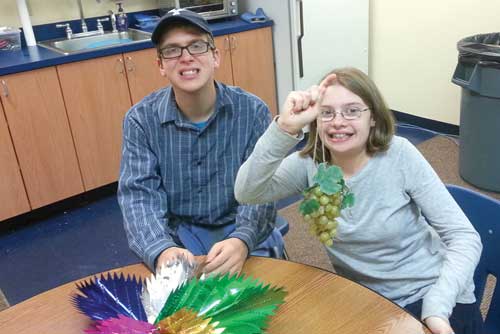.jpg)
.jpg)
Netivot, a new Teaneck-based Sinai Institute program for high school graduates looking to transition into adult life, began its inaugural year on September 9 with five participants. With 32 years running elementary schools in two locations, high schools in three and a group home for adult men, Sinai administrators thought it was time to fill a gap they had yet to address.
“It’s really a transitional program for young adults who have aged out of high school and are not quite ready for the next step,” Chavie Hagler, Netivot director, said. Hagler also heads up adult services for Sinai which involves running the group home.
Individuals in the program all exhibit developmental disabilities, mental or physical impairments that limit the individual’s ability to care for him/herself, interact well with others, or have self-direction or economic self-sufficiency among other limitations.
Hagler, along with Sinai dean Rabbi Yisrael Rothwachs and instructors brought on both from within and outside of Sinai, have developed a 12-month curriculum featuring computer usage, banking, meal planning, transit use and vocational training. They anticipate that Netivot participants will each spend a number of years in the program, but the exact length will be dependent on the specific individuals.
“Ultimately, what will help these participants become independent will be getting jobs and holding on to them,” Rothwachs said. Netivot courses are designed to bridge the transition between adolescence and adulthood, a process that happens naturally for the typical developing person. “Our participants just need a little more help with that,” said Rothwachs.
Students at Sinai’s high school programs currently spend one to three hours a week working at a variety of jobs, but Netivot is a much more intensive and immersive program. It aims to instruct participants in how to be employees: how to dress for work, how to interact with coworkers and supervisors and the skills necessary for specific jobs.
Vocational placement won’t begin until October, Hagler said, but there are a wide variety of options at schools, food establishments, offices and businesses. There are many more opportunities than there are participants because the idea is to help them discover what they want as a career. Studies have revealed that having a welcoming employer is integral in order for a developmentally disabled individual to succeed in the workplace. Additional key factors include having a supportive family, the ability to work hard and community involvement.
A major facet of independence is meal planning and preparation. At Netivot the participants prepare a meal plan at the beginning of each week. They discuss what they will need to buy for those meals, go shopping for those ingredients and then learn how to safely prepare those foods.
“Netivot has had a wonderful beginning. The participants have quickly gotten used to the routine: having classes, making lunch together, and going on community trips to apply what we have learned. They are looking forward to beginning their vocational training,” Hagler said about the first week of classes.
Future participants are expected to join at the beginning of each year fromthe Sinai program and from other similar programs. Hagler said non-developmentally disabled persons “don’t finish when they’re done with high school, and there’s no reason this group should be any different.”
By Aliza Chasan










